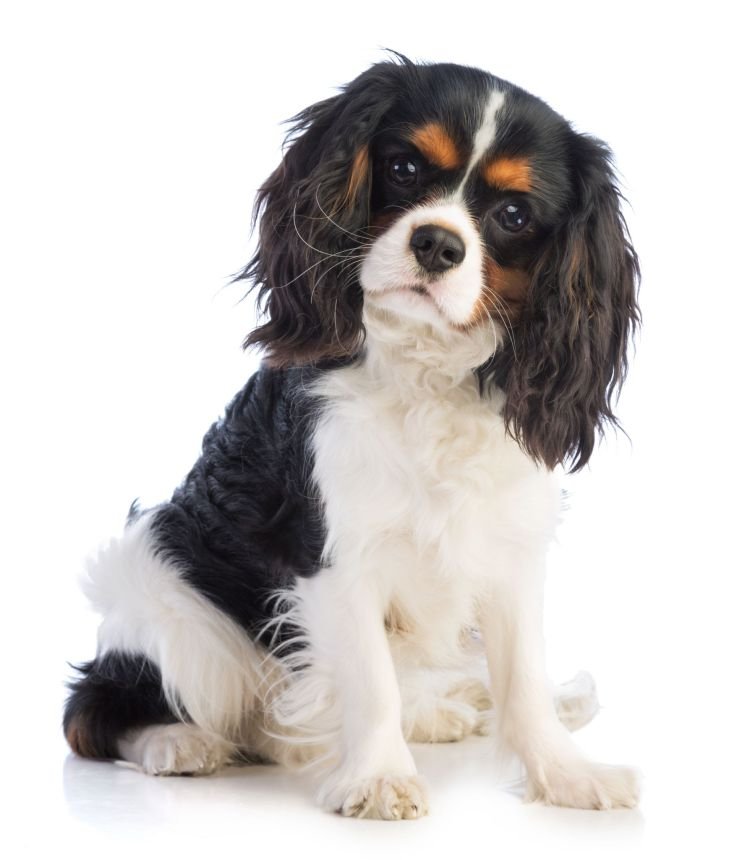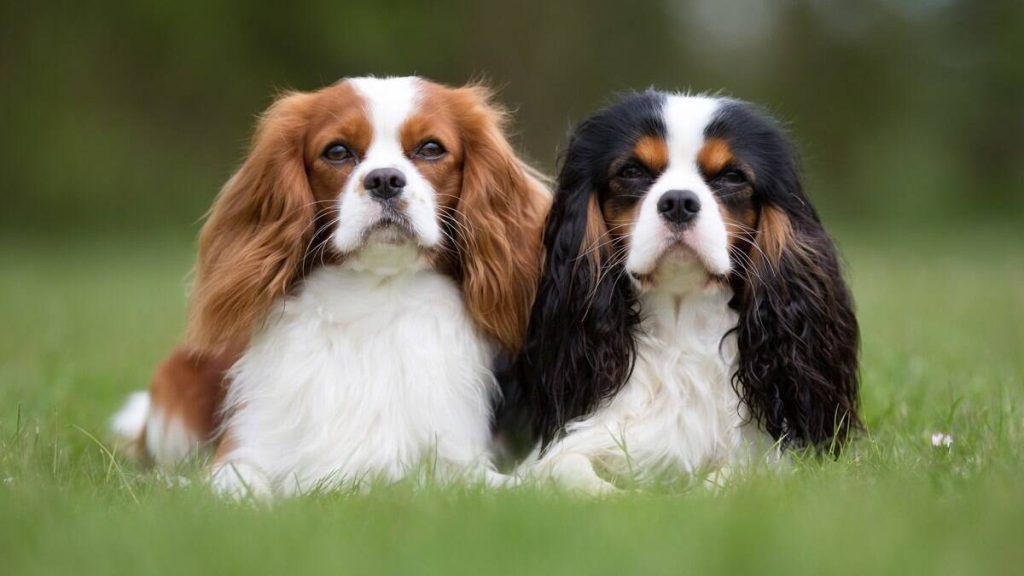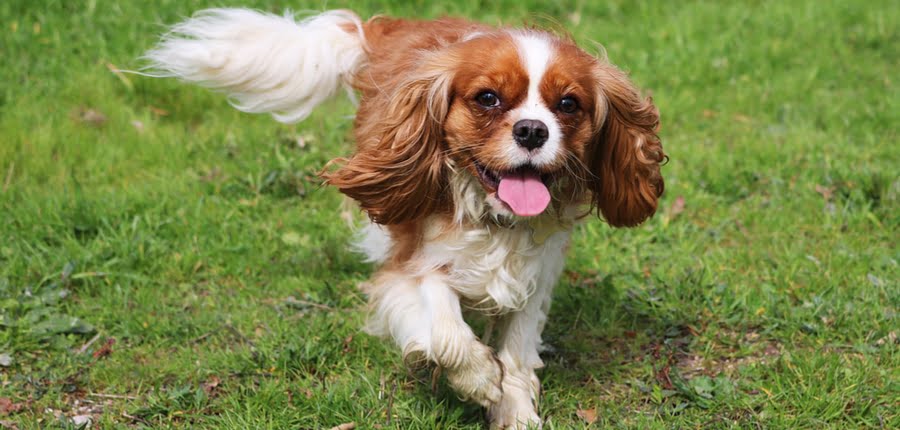
A popular toy dog in the UK, especially by the royalty of England, the Cavalier King Charles Spaniel was recognized by the American Kennel Club in 1996. This breed is eager to please and is a willing volunteer to become a lap or foot warmer.
Considering the average selling price, the Cavalier King Charles Spaniel is the most expensive dog breed that you can buy.
This article will provide you with information about other necessities that increase the initial cost. Recurring costs which include food, hygiene and grooming, and medical costs are also significant and will be detailed as well.
Contents
Purchase Cost of Cavalier King Charles Spaniel
A Cavalier King Charles Spaniel costs between $1,800 and $3,500 for a puppy depending on where you live and depending on how strong its genetics are. Mixed breed Cavaliers, like Pugaliers and Cavapoos, for example, can cost from $600 up to $2,000.
People tend to pay less for mixed breed dogs even though they are considered “designer” dogs. Overall, the price of purebred and mixed breed Cavaliers is likely to be in the thousands.
The price of an adopted Cavalier will be significantly lower; being $200 on average. But depending on the age, health, and the cost of their medical care, they can be as much as $700.
It is common for Cavaliers to come from puppy mills which can be capable of cruel practices like inbreeding. These dogs will be cheaper but you are more likely to run the risk of purchasing one with some serious health conditions.
Other One-Time Expenses
- Shelter Costs
Cavalier King Charles Spaniels are toy dogs and owners will usually allow these Spaniels to roam freely indoors but it is still necessary to have a crate. Crates will not only provide the Spaniel with a safe resting spot, but it can also be used as a tool to address issues such as destructive biting and potty training.
Since a Cavalier King Charles Spaniel can only grow up to 13 inches in height, you will only need to buy a small cage. Do not worry if your puppy is too small for the cage as dividers can be used to adjust the available space.
A 22″ long x 13” wide x 16” high double-door steel dog crate with a carry handle, slide-bolt latches, rubber “roller” feet, a plastic pan bottom, and a divider will cost $26.
Your toy dog will always want to relax beside you so it is necessary to have a non-slip mat that you can place on the floor, couch, crate, inside the car or wherever you want your pet to feel comfortable. At the same time, preventing these surfaces from accumulating dander and fur.
A 36″ x 22″ x 1.2″ washable bed mat that is made from durable plush fleece will cost $30.
Because the Cavalier King Charles Spaniel is a breed with long droopy ears, a specialized food or water bowl that is raised and narrow will be necessary to keep the ears dry and clean. Stainless steel is the preferred material instead of plastic or ceramic because it is not conducive to bacteria and does not contain hazardous materials.
A 17-ounce stainless steel bowl with a rubber base to protect the floor and prevent slipping will cost $19.
- Dog Accessories
Even though your Spaniel is an indoor dog, it will need to be walked like other dogs. A heavy-duty braided nylon rope leash with an anti-pull bungee extension for shock absorption will cost $17, while a dog harness with 2 leash attachment points, a padded chest and belly panel, and 4 points of adjustment will cost $40.
A personalized stainless steel pet ID tag that will help identify your pet when it gets lost will cost $8. Unfortunately, tags can fall off or be removed so you may opt to have your pet microchipped as well.
A microchip is a small and inert RFID transponder that is placed under the skin of your dog. Having your pet microchipped will cost $30 to $60.
- License and Permits
Licenses and permits are not usually requirements when owning a dog. But if you plan on traveling with your pet to different countries or across states, one common requirement is your dog’s health certificate. It is proof that the vaccinations of your pet are up to date and that your pet is not carrying infectious diseases.
The certificate can be obtained from an accredited veterinarian. The consultation and necessary vaccinations may cost up to $300.
On the other hand, annual license fees for fixed animals range from $10 to $20 and $20 to $50 for unfixed.

What are Included?
As you can see above, when you buy your Spaniel, it will come up to date with vaccinations and deworming. Depending on the age of the dog, you may have to continue with subsequent shots.
A reputable breeder will also have the parents screened for any diseases that may be inherited by the litter. The health certificates of the parents and the puppy should also be included in the sale.
A registration certificate will also be provided if the puppy is already registered in an official registry.
Recurring Costs of Owning a Cavalier King Charles Spaniel
- Food Costs
A 15-pound bag of “small breed” adult dog food will cost $50. Commercial dog food will include prebiotics, probiotics, and a vitamin and mineral premix in the formulation which will reduce the need for food supplements.
An 8-ounce pack of freeze-dried treats that are made from beef liver or chicken breast will cost $22 to $25. These treats do not contain carbohydrates that can easily fatten your pet but you can further prevent overfeeding by breaking the treats into smaller pieces to ensure that you are not feeding more than 10% of your pet’s caloric intake.
- Hygiene and Grooming Costs
It is recommended to brush your pet’s teeth 2 to 3 times a week to prevent future dental problems. A 3.5-ounce tube of enzymatic dog toothpaste with a triple-headed toothbrush will cost $9.
The nails must also be trimmed 2 to 3 times a month. Dog nail clippers with a safety guard to prevent over-cutting and a nail file will cost $13. A 1.5-ounce bottle of styptic powder will cost $6 and is useful for stopping the bleeding in case you accidentally cut the quick.
The hanging, floppy, and feathered ears of the Cavalier King Charles Spaniel are prone to infections so it needs to be wiped with a cotton ball with dog ear cleaning solution once a week. An 8-ounce bottle of ear cleaning solution for bacterial, viral, and yeast infections will cost $55.
The coat of the Cavalier King Charles Spaniel will require a lot of effort to groom and the cost will be significant as well.
The breed has 2 layers in its coat: a long and silky layer and a short and smooth layer. The coat will require daily brushing, especially the longer feathered areas which can easily become tangled.
A self-cleaning slicker brush to remove mats, tangles, knots, loose hair, dander, and trapped dirt will cost $16 and a double-sided pin and bristle brush for grooming will cost $17.
This Spaniel breed has feathered, fluffy fur on its feet which may cause problems when walking. The AKC allows the hair between the pads of the underside of the feet to be trimmed. A 2-piece set of bullnose pet grooming stainless steel scissors for trimming fur will cost $17.
If you are not planning to enter your dog in a show, you may prefer to trim the whole coat. An electric clipper with different attachment guide combs and other accessories will cost $36.
Note that cutting the coat will make the fur grow back thicker and curlier which will require more maintenance and it may also not grow back to its natural shape.
A bath once a month will also be necessary. A 20-ounce bottle of natural moisturizing shampoo with a non-toxic, soapless formula made from certified vegan organic ingredients will cost $14.
Drying the coat is not as straightforward because rubbing with a towel to dry will cause tangles to form. A chamois pet towel is very absorbent and is a good choice for pat drying the fur. A 4-piece pack of 26″x16″ synthetic chamois will cost $13.
After patting, a hairdryer will be used to further dry the coat. A gentle and quiet pet dryer with 2 heat and airflow settings will cost $30.
- Medical Costs
Aside from wellness visits that cost $50, your pet will also need vaccinations and boosters.
Your pet will be required to have DA2P ($18-$35) and Rabies shots ($19-$25) because these viruses easily spread and are debilitating. You may opt to have your pet vaccinated against other common viruses such as Bordetella ($12-$35), Canine Influenza Virus, ($24-$39), Leptospirosis ($35), and Lyme ($35).
Deworming is also critical in proper health care. Roundworm or hookworm deworming will cost $21 while tapeworm deworming will cost $35. Heartworm tests will cost around $10 to $50 and 1 year worth of medication will cost $6.
There are also medical conditions that are very common to the Cavalier King Charles Spaniel. These conditions can be quite random but it is a good idea to prepare for them.
Cavaliers are prone to conditions such as heart murmurs, mitral valve insufficiency, patellar luxation, entropion, seizures, epilepsy, syringomyelia, canine hip dysplasia, and sometimes retinal dysplasia. Others include low blood platelet, ear disorders, and strokes.
Mitral Valve Disease is a terminal illness that causes the deaths of many Cavaliers; mainly seniors ten years of age and older. A Cavalier with mitral valve disease requires regular medical visits which can cost up to $6,000 – with mitral valve surgery costing as much as $50,000. Understandably, most owners are not willing to pay that much.
Hip dysplasia or the abnormal looseness in the ball and socket joint in the hips may require your pet to undergo weight and exercise reduction to manage the pain. But for severe cases, corrective or replacement surgery may be necessary which can cost from $2,000 to $6,000.
Luxating patella is common to breeds that are less than 30 pounds. The dislocation of the kneecap may simply require medication to reduce inflammation and pain but in severe cases, it can lead to Cranial Cruciate Ligament which would eventually lead to surgery. This will cost $500 to $4,000 per knee.
Syringomyelia is the accumulation of cerebral spinal fluid in the spine. Surgery can be performed or medication may be taken as a treatment. The cost of the MRI scan to detect the disease is $1,825 + $250 for every additional site.
On the other hand, entropion surgery can cost from $500 to $1500.
There are also conditions that are specific to the Cavalier King Charles Spaniel. A DNA test of the parents will allow the breeder and prospective buyer to see if the breeding line carries the genetic mutation that causes these conditions. This costs $60 to $170.
The Cavalier Episodic Falling Syndrome manifests as episodic attacks of abnormal muscle movements that are triggered by exercise, stress, anxiety, excitement, and apprehension. Medication to relax the muscles to stop the episodes from occurring costs $500 to $3,000.
CKCS dogs with Dry Eye Curly Coat Syndrome or Ichthyosiform Dermatosis cannot produce tears which makes their eyes sore. These dogs can also be easily spotted because of their rough or curly coat.
Affected dogs also suffer from other skin diseases as well as dental diseases. The cost of treatment for the various complications will cost $300 to $2,500 but because of the poor quality of life, the dog will usually be put out which will cost $60 to $65.
Overall this breed can be susceptible to a variety of health problems, so new Cavalier owners must not only be prepared to face these medical conditions but their high cost as well. On the other hand, the vet costs of a healthy cavalier can add up to roughly $350 a year.
- Toys
A 2.5” diameter bouncy and durable fetch and chew ball with ridges to clean and massage gums and can be used to dispense treats will cost $10.

Cost Considerations for CKCS Breed
One of the Cavalier King Charles Spaniel price factors is coloration. There are four colors to choose from: Blenheim (chestnut and white), black and tan, ruby (all chestnut), and tricolor (black, white, and tan).
The currently popular coloration is Blenheim but the favored coloration during the time of Charles I and Charles II is black and tan. So, it is safe to say that the favored coloration is seasonal.
Medical screening tests from specialists for the American Cavalier King Charles Spaniel Club will be more expensive than from a vet that is not a specialist on the breed. If you are planning to buy a puppy with papers from officially recognized specialty groups, expect the price to be higher.
Similarly, generic health guarantees will be cheaper than commercial pet insurance.
The last factor is dog registration. The American Kennel Club has established the official standard for this breed and has two different registrations: the full and the limited registration.
A full AKC registration is a requirement for entering your pet on a conformation show and breeding. A limited AKC registration will only allow you to enter into minor AKC events and your pet’s litter cannot be registered.
